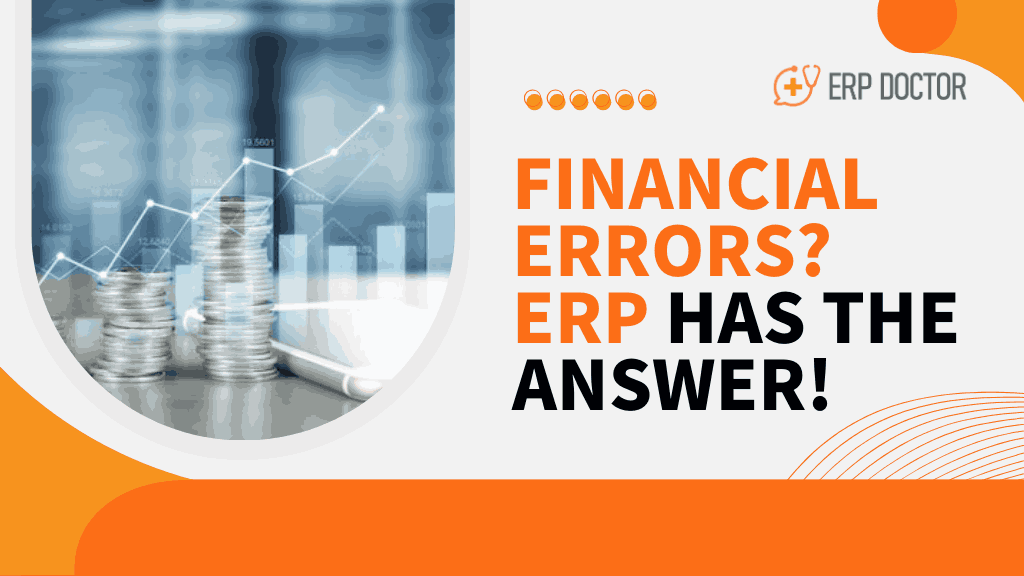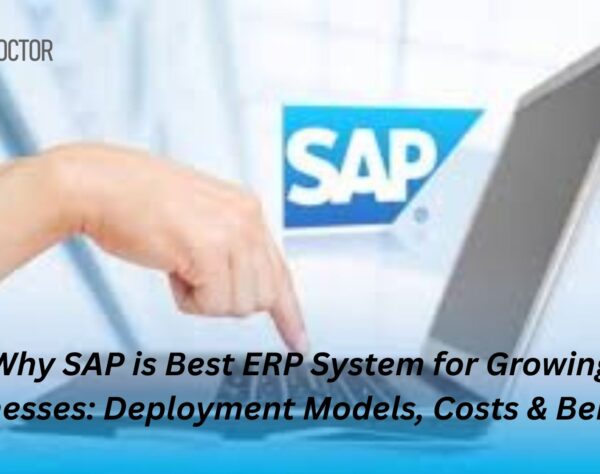
Financial Errors Draining You? ERP Is the Answer

Save Time & Money: ERP Solves Financial Error Headaches
Are financial errors consistently draining your resources and time? It’s not just frustrating—it’s costly. With businesses constantly navigating through a sea of transactions, it’s easy to make mistakes that can lead to bigger problems down the line. But what if you could minimize these errors and streamline your entire financial process? This is where ERP for financial errors steps in to help.
When it comes to managing your business finances, having a solid ERP solution is like having a reliable partner. Whether you’re a small startup or an established enterprise, ERP systems have the power to revolutionize your financial operations. Let’s explore how an effective ERP software solution can eliminate financial errors and put your business back on the path to success.
What Is an ERP System?
ERP (Enterprise Resource Planning) is more than just software; it’s a comprehensive system designed to integrate various business processes—from finance and accounting to inventory and operations. ERP solutions centralize data, providing real-time visibility and streamlining decision-making.
When it comes to finance, ERP integration is a game-changer. It automates repetitive tasks, reduces manual errors, and ensures compliance with regulatory standards. Let’s explore how ERP implementation can resolve financial errors and transform your business.
Common Financial Challenges Businesses Face
- Manual Data Entry Errors: Even the most meticulous individuals can make mistakes, and in finance, small errors can lead to big losses.
- Inconsistent Data Across Departments: Lack of a unified system often results in discrepancies and miscommunications.
- Delayed Reporting: Without an integrated system, generating timely and accurate financial reports becomes a challenge.
- Regulatory Non-Compliance: Staying compliant with ever-evolving financial regulations is crucial but complex without the right tools.
- Limited Insights: Without robust analytics, identifying trends or making informed decisions becomes guesswork.
How ERP Software Solves Financial Errors
1. ERP for Financial Errors: Automating Processes
ERP solutions eliminate the need for manual data entry by automating critical tasks like invoicing, payroll, and reconciliations. This reduces errors and frees up time for strategic activities.
2. Ensures Accurate Financial Reporting
With real-time data access, an ERP system allows you to generate accurate financial reports effortlessly. No more scrambling for information at the last minute.
3. Streamlining Financial Errors with ERP Integration
By integrating all business functions, ERP software ensures consistency and accuracy across departments. This unified approach minimizes discrepancies and fosters better collaboration.
4. Enhances Compliance Management
ERP systems are equipped with tools to track and comply with regulatory requirements, reducing the risk of penalties and audits.
5. Provides Actionable Insights
With advanced analytics and dashboards, ERP solutions enable businesses to identify trends, forecast accurately, and make informed decisions that drive growth.
Key Benefits of ERP Implementation for Finance
- Improved Accuracy: Eliminates human errors with automated workflows.
- Cost Efficiency: Reduces operational costs by streamlining processes.
- Real-Time Data: Offers instant access to financial metrics.
- Scalability: Adapts to your business needs as you grow.
- Enhanced Security: Protects sensitive financial information with robust security protocols.
How to Get Started With ERP Implementation
- Assess Your Needs: Identify the financial challenges your business faces.
- Choose the Right ERP Software: Look for a solution tailored to your industry and business size.
- Partner With Experts: Work with a trusted vendor for seamless ERP integration.
- Train Your Team: Ensure employees are well-equipped to use the new system.
- Monitor and Optimize: Regularly review performance and fine-tune the system to meet evolving needs.
FAQs About ERP and Finance
1. How does ERP reduce financial errors?
ERP minimizes errors by automating manual processes, centralizing data, and providing real-time insights. With built-in validation and data checks, it ensures that all financial transactions are accurate and consistent.
2. What are the benefits of ERP integration for finance?
ERP integration connects different departments, ensuring that financial data flows smoothly between systems. This leads to better accuracy, faster decision-making, and less chance of errors. It also eliminates the need for duplicate data entry, reducing the likelihood of mistakes.
3. How long does it take to implement an ERP system for finance?
The timeline for ERP implementation depends on the size of your business and the complexity of your financial processes. Typically, it takes several weeks to a few months. Proper planning and training are essential for a smooth implementation.
4. Can ERP systems help with financial forecasting?
Yes! ERP systems have advanced reporting and analysis features that provide real-time insights into your business’s financial performance. This helps you create accurate forecasts and make informed decisions about future investments.
5. Is ERP software suitable for small businesses?
Absolutely! ERP systems are available in various sizes, including affordable solutions for small businesses. These systems can streamline financial processes and help small businesses grow efficiently without the need for extensive manual labor.
Stop the Drain: How ERP Can Save Your Business from Financial Errors
Financial Errors Draining You? ERP Is the Answer! Financial errors don’t just drain money—they drain time, energy, and trust. Investing in an ERP system is more than a solution; it’s a strategy for sustainable growth. Whether you’re a small business or a large enterprise, the right ERP software can be the cornerstone of your financial success.
Ready to take control of your finances? Start your journey to error-free financial management today at erpdoctor.in! Need expert advice? Fill out the form below, and we’ll reach out to you soon!







